Warren Dudley is an award-winning screenwriter and author from the UK, who has spent all his life living in Seaford, East Sussex, and the surrounding areas. He studied at Tideway School in Newhaven before embarking on a career in print and design.
After a brief dalliance with music in the 1990s with his band steBson, Warren turned to writing and making a small budget movie called Lived with Rick Roberts in the early 2000s. After several more self-made films projects, he got his big break when the opportunity to adapt Dave Roberts’ football memoir The Bromley Boys was handed to him by friend and producer TJ Herbert in 2012. The movie went on to have a successful UK and US cinema run and has garnered critical acclaim. In 2018 he worked with Blair Witch Project director Eduardo Sanchez on a pilot for Sky TV.
In November 2020 he released his first football novel, Sir Unwin Pugh: From Hull to Camp Nou following his debut horror novel in July 2020, Baby Blue: An American horror story.
Footballbookreviews (FBR): What is your first football memory?
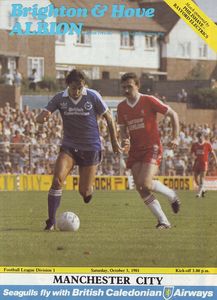 Warren Dudley (WD): My first game was a 4-1 win for Brighton over Manchester City in around 1981 I think (Editors Note: 03 October 1981 – League Division One: Brighton beat City 4-1 at the Goldstone Ground). My first very strong football memory is being 3-0 down at half-time in the 1983 FA Cup Final Replay against Manchester United. I sat in my bedroom aged ten and burst into tears…that’s when it all started.
Warren Dudley (WD): My first game was a 4-1 win for Brighton over Manchester City in around 1981 I think (Editors Note: 03 October 1981 – League Division One: Brighton beat City 4-1 at the Goldstone Ground). My first very strong football memory is being 3-0 down at half-time in the 1983 FA Cup Final Replay against Manchester United. I sat in my bedroom aged ten and burst into tears…that’s when it all started.
FBR: You are a Brighton fan, how did this come about, and have you weaved them or their rivals into the Sir Unwin Pugh storyline?
WD: My Dad and Grandad were both big Albion fans so it was inevitable I would be too I guess. It’s been a long and varied 35 years of going to games come rain or shine. Ranging from the fight to keep The Goldstone, away games at Gillingham, the move to the Withdean athletics ground and then on to The Amex. Being in the Premier League now is a very odd, and not always a great experience…the journey was much more fun than the destination. As for our rivals Crystal Palace, there is one chapter dedicated to them in the book. It’s all done with love though!
FBR: How did you get into writing?
WD: I started ‘filmmaking’ about 15 years ago just making little, short-films and ideas. This progressed into writing longer scripts and culminated in me writing a football mock-doc TV pilot called Newhaven Port in 2005-ish. It was on that set where I met TJ Herbert. He went on to become a movie producer and offered me the chance to adapt Dave Roberts fantastic book The Bromley Boys – that was my big break. Since then I have attempted to make writing my living. It’s incredibly tough and I am lucky to have a very patient wife.
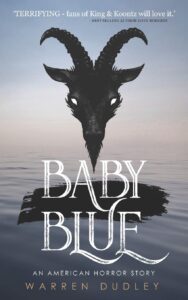 FBR: You have previously written a book, “Baby Blue: An American horror story” and now this football related story. How did you come to make the transition between two different genres?
FBR: You have previously written a book, “Baby Blue: An American horror story” and now this football related story. How did you come to make the transition between two different genres?
WD: When I look back on my writing ‘career’ it appears I have written something scary and then immediately followed it up with a football palate cleanser. I love both genres but find it hard to keep doing just the one. The horror/thriller stuff is often more commercially viable but not nearly as much fun.
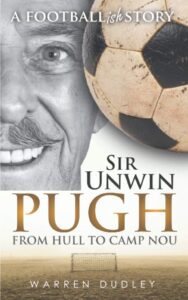 FBR: What was the inspiration for writing the Sir Unwin Pugh book?
FBR: What was the inspiration for writing the Sir Unwin Pugh book?
WD: I have become quite good mates with Dave Roberts, since I adapted his book for screen. We are always batting ideas backwards and forwards and when I mentioned this he didn’t think it was a terrible idea. I had a look around on Amazon and it didn’t seem to be a very well-trodden path (there could of course be a good reason for that!) For me it’s just a lovely opportunity to write something that gives me a blank canvas to come up with a series of silly footballing anecdotes – something I am always very happy to do…
FBR: Is Sir Unwin Pugh based on anyone?
WD: Not really – he’s one of those slightly posh Alf Ramsay types. Saying that, I was often picturing Paul Whitehouse as Rowley Birkin QC from The Fast Show while writing.
FBR: What are the major differences between screenwriting and writing novels?
WD: It’s been one of the great pleasures of switching from screenwriting to writing books. When you write for the screen you are always thinking about budget and being harassed by producers to keep things tight. When writing a book, if you want to send your main character to manage a team in Borneo you can do just that without worrying about who’s gonna pay for the trip!
FBR: Thank you Warren for your time! All the best with the book.
For more information about Warren, please visit his website www.sixty6media.co.uk
You can also follow Sir Unwin Pugh on Facebook www.facebook.com/Sir-Unwin-Pugh-104266528140900
 This is the fourth book from Texi Smith featuring his character, Jarrod Black, following on from Introducing Jarrod Black (book one), Jarrod Black – Hospital Pass (book two) and Jarrod Black – Guilty Party (book three) as well as his book about Jarrod’s sister, Anna Black – this girl can play.
This is the fourth book from Texi Smith featuring his character, Jarrod Black, following on from Introducing Jarrod Black (book one), Jarrod Black – Hospital Pass (book two) and Jarrod Black – Guilty Party (book three) as well as his book about Jarrod’s sister, Anna Black – this girl can play.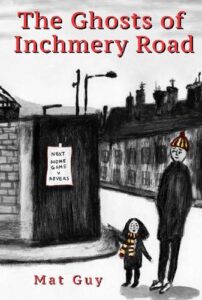 Sometimes, after a night match, once the crowds and players have gone and the floodlights snap off, they come out once more: swaying crowds on the terraces looking on expectantly, silently applauding at long-gone players in oversized shirts and shorts, passing and running, chasing the ball across the pitch. People, for whom it meant just as much as it does to us today. They dissolve back into darkness. Then the nightwatchman starts on his rounds.
Sometimes, after a night match, once the crowds and players have gone and the floodlights snap off, they come out once more: swaying crowds on the terraces looking on expectantly, silently applauding at long-gone players in oversized shirts and shorts, passing and running, chasing the ball across the pitch. People, for whom it meant just as much as it does to us today. They dissolve back into darkness. Then the nightwatchman starts on his rounds.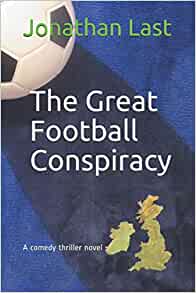 On 18 April 2021 the football world went into meltdown when 12 clubs (AC Milan, Arsenal, Atletico Madrid, Barcelona, Chelsea, Inter Milan, Juventus, Liverpool, Manchester City, Manchester United, Tottenham Hotspur and Real Madrid) announced the creation of a European Super League (ESL). There was a universal outcry from FIFA and UEFA, clubs, governments, the media and fans, who saw what the ESL for what it was, a closed shop for those invited, who perceived themselves as the ‘biggest’ clubs, motivated not by the interests of the global game but by greed. The opposition was so vociferous that within three days, only Barcelona, Juventus and Real Madrid remained still in support of the project. What it showed was that there was a widespread belief that the ESL went against the integrity of the game, and that fans still had a part in making their views know in affecting decisions.
On 18 April 2021 the football world went into meltdown when 12 clubs (AC Milan, Arsenal, Atletico Madrid, Barcelona, Chelsea, Inter Milan, Juventus, Liverpool, Manchester City, Manchester United, Tottenham Hotspur and Real Madrid) announced the creation of a European Super League (ESL). There was a universal outcry from FIFA and UEFA, clubs, governments, the media and fans, who saw what the ESL for what it was, a closed shop for those invited, who perceived themselves as the ‘biggest’ clubs, motivated not by the interests of the global game but by greed. The opposition was so vociferous that within three days, only Barcelona, Juventus and Real Madrid remained still in support of the project. What it showed was that there was a widespread belief that the ESL went against the integrity of the game, and that fans still had a part in making their views know in affecting decisions. Warren Dudley (WD): My first game was a 4-1 win for Brighton over Manchester City in around 1981 I think (Editors Note: 03 October 1981 – League Division One: Brighton beat City 4-1 at the Goldstone Ground). My first very strong football memory is being 3-0 down at half-time in the 1983 FA Cup Final Replay against Manchester United. I sat in my bedroom aged ten and burst into tears…that’s when it all started.
Warren Dudley (WD): My first game was a 4-1 win for Brighton over Manchester City in around 1981 I think (Editors Note: 03 October 1981 – League Division One: Brighton beat City 4-1 at the Goldstone Ground). My first very strong football memory is being 3-0 down at half-time in the 1983 FA Cup Final Replay against Manchester United. I sat in my bedroom aged ten and burst into tears…that’s when it all started. FBR: You have previously written a book, “Baby Blue: An American horror story” and now this football related story. How did you come to make the transition between two different genres?
FBR: You have previously written a book, “Baby Blue: An American horror story” and now this football related story. How did you come to make the transition between two different genres? FBR: What was the inspiration for writing the Sir Unwin Pugh book?
FBR: What was the inspiration for writing the Sir Unwin Pugh book?